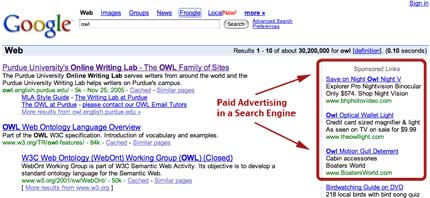How the Internet and Search Engines Work

Welcome to the Purdue OWL
This page is brought to you by the OWL at Purdue University. When printing this page, you must include the entire legal notice.
Copyright ©1995-2018 by The Writing Lab & The OWL at Purdue and Purdue University. All rights reserved. This material may not be published, reproduced, broadcast, rewritten, or redistributed without permission. Use of this site constitutes acceptance of our terms and conditions of fair use.
The Internet is made up of a vast amount of computers networked throughout the world via data lines or wireless routers. New computers and websites are added every day, and no larger organizational system exists to document and catalogue them all. The Internet is a dynamic, growing, and changing system, which makes navigating it or searching it thoroughly difficult.
This is where search engines and Web directories come in. Search engines, such as Google or Yahoo, are large databases of information that store and retrieve relevant website results based on keywords. Web directories, such as DMOZ, are attempts to organize the best of the existing websites into categories and subcategories. No search engine or web directory will have the same sites listed in the same order, and none will have all of the possible sites on the Internet listed. Furthermore, the ranking of a website within a search engine (i.e. how high up on the results list it appears) has as much to do with politics as it does with quality information. The search engine rankings are determined by a number of factors including the amount of information on the site, the amount of other sites that link to it, the number of people who select that link when searching, the length of time that the site has been listed in the search engine database, and the code of the site.
Recently, search engines such as Google and Yahoo have also been providing "sponsored links"—links that appear on the first few pages of the search results and that are paid for by advertisers. This means that you may end up clicking on something that is not relevant to your search, but instead actually advertising. The image presented here gives you an example of this on Google.

Example of paid advertising links at Google.
What does this mean for a researcher? Understanding the nature of the Internet, how to navigate it, and how it is organized can help you assess the quality of information and websites, filtering out that which does not relate or is of questionable quality.